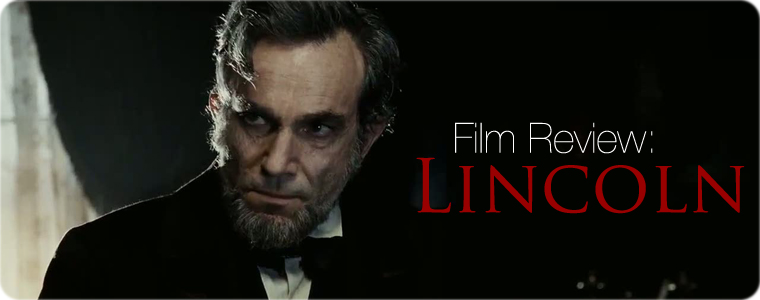Even the Best Men Are Only Men, at Best
by Andrew Collins
History has a way of idealizing great leaders by framing them in the simplistic light of a few key accomplishments. Not so in Steven Spielberg’s latest cinematic offering, Lincoln. This fresh take on one of the most revered figures in American history shows Abraham Lincoln as a real person — not the guy on our pennies and five-dollar bills, engraved on Mount Rushmore, and whose statue overlooks the National Mall in Washington, DC. Indeed, for a political-historical drama, Lincoln achieves a wonderful blend of idealism and realism.
The story revolves around President Lincoln’s dogged, unflappable drive to pass the 13th Amendment and abolish slavery. It takes place in the lame duck session right after Lincoln was re-elected to his second term and Republicans won a landslide in Congress. The Senate already had passed the amendment, but even if all Republicans in the House voted for it, they would still be 20 votes short. Lincoln gets the 13th Amendment passed of course, but to do it he must pull every not-overtly-illegal political string possible. The result is a wonderful ride of high political drama.
Historically accurate or not, this is the Abraham Lincoln that we want to believe actually existed. From the first scene to the last, Daniel Day-Lewis puts on a masterful performance, painting a colorful, three-dimensional portrait of our 16th president. This Abraham Lincoln has a soft, almost fragile voice, but when he speaks, everyone around him listens, and rarely does anyone interrupt him as he pulls gem after gem from the vast treasure trove that is the wisdom of a self-taught man. He is principled and genuine, good-humored and affable, down to earth and a respecter of all persons, a brilliant orator in both public and private.
But he’s not quite the good old “Honest Abe” we learned about in grade school.
No, this Abe is also intensely cunning, calculating, politically astute, and even vulgar and obscene when necessary. In one scene he tells a potty joke to a group of Union telegraph operators. He swears at his closest advisory council when they all try to persuade him to postpone his plans to pass the amendment. He talks about the great power he wields as president and uses that power to enact orders of questionable legality — but for the greater good of the nation. For example, he passively allows his Secretary of State to employ a team of less-than-reputable men to bribe defeated congressmen for votes by offering them appointed positions. He also delays a delegation of Southern leaders who seek to negotiate a peace agreement to end the Civil War. If the war ends, so does Lincoln’s opportunity to abolish slavery.
The crazy part is that Lincoln succeeds in making us feel like sometimes the political posturing and behind-the-scenes corruption are good things. When the feisty Congressman Thaddeus Stevens (played brilliantly by Tommy Lee Jones) makes his appeal before the House in favor of the amendment, he tones down his language by arguing for the amendment as a means to promote equality before law, but not racial equality, even though he had made plenty of such claims in the past. The notion that one could even make a distinction between the two is astonishing to 21st century audiences, yet as Stevens stands to speak, the House floor thick with tension, we want him to tone down his language. After all, any politician worth his salt knows that to get something passed, you can’t alienate your more moderate supporters or give your opponents ammunition to frame you as a radical. It’s an inside look at the culture wars — 19th century style.
I tip my hat to the production company for releasing Lincoln a week and a half after Election Day, for it is bound to resonate with those sick of the partisan bickering and mudslinging of election season. Anyone with even a cursory understanding of contemporary American politics will find Lincoln a wonderfully ironic tale. For one thing, the film takes today’s Republican and Democrat stereotypes and completely reverses them. The Republicans come across as the party of progress. They’re in favor of abolishing slavery through a constitutional amendment and granting equality before the law to African-Americans. The Democrats, on the other hand, seek to stonewall the amendment, and in the film they come across as the party on the wrong side of history.
It gets better. The congressman spearheading the Democrats’ drive to block the amendment’s passage is a passionate young man who appeals to God to support his view of the inherent inequality of the races. The movement in Congress to pass the amendment, on the other hand, is led by Thaddeus Stevens, a crusty old white guy who has spent a decade fighting for racial equality and appeals to natural law to support his views. He doesn’t give a damn what people think, yet he is more than willing to play all the political games necessary for his cause to succeed.
Obviously, Lincoln is intensely political, but — in an oddly refreshing way — perfectly fit for our times. It reminds us that even the finest moments of our nation’s history are far from pure. Every leader in the film is either driven by or at some point succumbs to political expediency. As bad as things may seem today, the essence of politics has never changed, for at the end of the day, in both Lincoln’s time and ours, it is ultimately an art of pragmatism. You do as much as you can, but you’ll never do as much as you’d like.
Even from our greatest leaders, we cannot expect more than that.






















